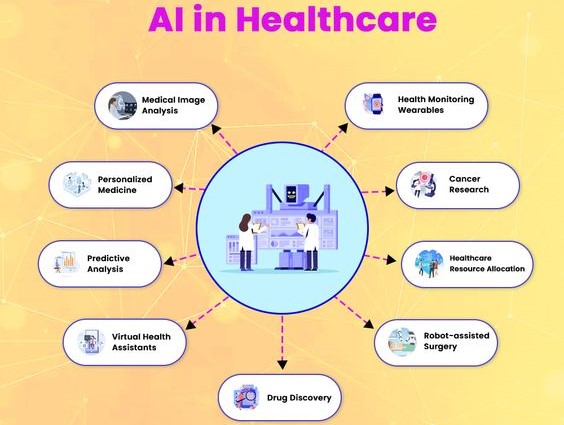
Table of Contents
Artificial Intelligence has seen a meteoric rise over the recent years, disrupting and transforming almost all global economic sectors. While AI in nursing is still a relatively new concept to most people, artificial intelligence has the potential to revolutionize healthcare. The nursing profession has a lot to gain from the integration of AI technologies.
Artificial Intelligence’s quick ascension into the limelight is mainly due to its multifaceted capabilities. AI entails the development of computer systems that can mimic human intelligence. They encompass tasks such as problem-solving, decision making and pattern recognition.
The growing popularity of AI in nursing and other sectors can also be attributed to the developments in machine learning, natural language processing and deep learning. The multi-faceted capabilities of Artificial Intelligence make a transformative force to reckon with in diverse fields such as healthcare, entertainment and finance.
The Usage and Implications of AI in Nursing
AI in nursing represents a mix of cutting-edge technologies that promise to redefine the delivery of healthcare. It entails the use of AI-powered tools, algorithms and systems to help nurses in their multi-faceted roles, ranging from clinical care and administrative roles. Artificial Intelligence applications cover a broad spectrum, including electronic health record (EHR) management, predictive analytics and medication administration.
One the main forces driving the integration of AI in nursing is its potential to improve the quality of patient care. Artificial Intelligence systems have the capacity to process larger volumes of patient data promptly, enabling timely and accurate support for clinical decisions. For example, AI algorithms can pick through patient records, identify trends, predict the progression of diseases and suggest personalized medication plans. That helps to alleviate the cognitive load on nursing practitioners and improves the precision and efficiency of delivering care to patients.
AI-enabled devices and sensors can facilitate the continuous monitoring of patients, with real-time updates on critical signs and instant alerts to nurses and other healthcare providers whenever anomalies occur. The proactive approach to patient monitoring can help nurses to ensure early interventions and improved patient outcomes. Besides, AI-powered chatbots and virtual assistants can interact with patients by answering questions and offering educational resources to promote patient engagement and health education.

The integration of AI in nursing is not only aimed at optimizing healthcare processes but, also to foster positive patient outcomes. Artificial Intelligence plays a fundamental role in preventive care, making sure that patients get timely screening and interventions. With strengths such as predictive modelling, Artificial Intelligence can identify people at risk of chronic illnesses or re-admission into hospitals. That could allow nurses to customize educational materials and interventions to serve those needs.
The use of AI can also help nurses to manage their workloads effectively. That is because AI facilitates the automation of routine tasks such as documentation and medication reminders. That allows nursing practitioners to dedicate more time for direct patient care, thereby promoting a more patient-focussed approach to healthcare. The shift in focus is important in improving patient satisfaction and promoting the overall healthcare experience.
Concerns About AI in Nursing
While AI promises a great future for nurses and patients, there are also growing concerns over its integration into the nursing profession. Some nursing educators have raised concerns about the potential impacts of Artificial Intelligence on their workloads and roles in nursing education. Some nurses are afraid that AI could potentially take their jobs away.
Another concern about AI in nursing is that the technologies are being developed at a very fast pace. That leaves no time for the intended users including nurses and patients to understand the potential benefits and unintended consequences of those tools. The quick development of AI tools also puts nurses and other practitioners at a disadvantage because it leaves them very limited time to acquire the necessary knowledge and competencies for using them.
The fast pace at which AI technologies are being developed is also concerning for policy makers and regulators. It means they must also act quickly to revise or develop new policies to safeguard the development and use of AI in nursing. The regulation of emerging technologies is a problem that many countries are facing today.
Ethical implications are also among the growing concerns of AI in the nursing profession. Nursing is a profession that requires empathy and, using AI technologies would potentially hinder the element of human touch. Ethical data use and privacy protection is another issue that many nurses have expressed regarding the integration of AI in nursing.
The Future of Artificial Intelligence in Nursing
Artificial Intelligence has the potential to significantly improve efficiency, effectiveness and work-life balance. It would transform nursing practice through augmenting clinical decision-making, optimizing workflows and improving patient monitoring. As nursing practitioners embrace the use of AI in nursing, it is essential to balance its benefits with ethical considerations so that patient-focused care remains a top priority.
Nurses’ embrace of change and forward-thinking mindset puts them at a better position to harness the potential of AI, emerging as leaders in a constantly changing setting where innovation prevails. AI can provide new insights for making better healthcare decisions. While AI offers unlimited possibilities for the nursing profession, practitioners should approach it with a lot of caution. Nurses must emphasize that AI tools are intended to support or help and, not replace the critical thinking for healthcare providers.
Nurses can deliver even more comprehensive and efficient patient care in future by harnessing the power of AI with human connection. There is no doubt AI holds a great potential for enhancing the delivery of healthcare, but its integration must be approached carefully. Setting a proper balance between AI and human involvement, addressing the ethical considerations and ensuring patient-focused care are crucial to overcoming the challenges and maximizing the benefits of AI in nursing.
Order a Custom Nursing Paper
NursingPapers is a premier academic writing platform that offers professional paper writing services for a wide range of educational materials and courses. We have skilled writers to deliver customized nursing essays, research papers and dissertations for undergraduate, Degree, Masters and PhD.







